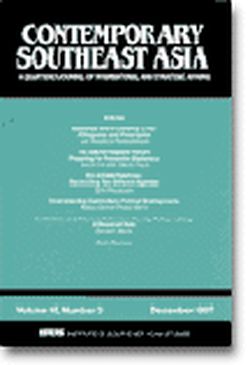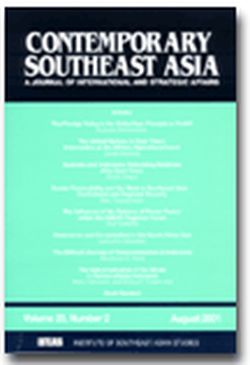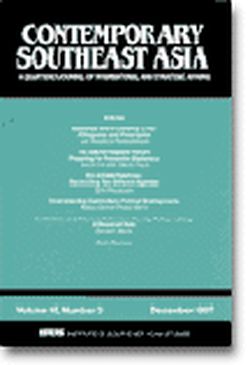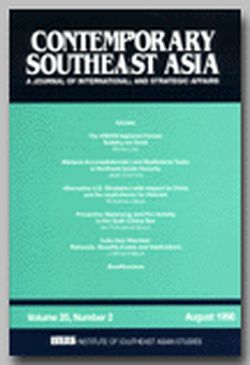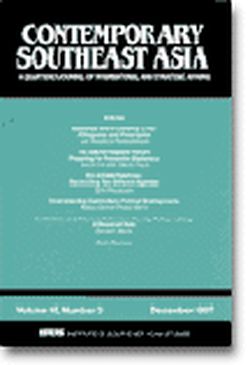Contemporary Southeast Asia: A Journal of International and Strategic Affairs Vol. 22/1 (Apr 2000)
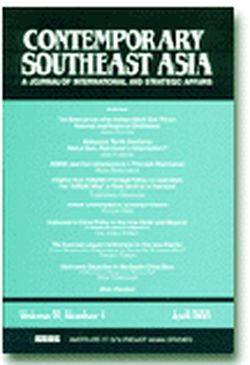
Date of publication:
April 2000
Number of pages:
231
Code:
CS22/1
Contents
-
Preliminary pages
-
The Emergence of an Independent East Timor: National and Regional Challenges, by James Cotton, contributor see abstractFor a generation, the East Timorese independence struggle was ignored by Southeast Asian nations and by Australia. However, Indonesia's annexation never gained full international recognition, and with the failure to win the allegiance of the majority of the population and in the context of national political uncertainty, the crisis in the territory led to United Nations (U.N.) intervention. However, the U.N. mandate will be difficult to execute, given the material and political problems in the territory. Indonesia's record has already generated unprecedented domestic and international scrutiny of the role of the military. The contribution of Australian diplomacy and military power to the resolution of the East Timor issue has brought into question longstanding Australian regional policies. In the case of ASEAN, which had previously supported Indonesia on the issue, the East Timorese independence movement has also raised difficulties for the grouping.
-
Malaysia's Tenth Elections: Status Quo, Reformasi or Islamization?, by John Funston, contributor see abstractMalaysian politics have been in upheaval since Dr Mahathir Mohamad sacked his deputy, Anwar Ibrahim, in September 1998. That made the 1999 elections one of the most keenly contested ever. For the first time, the ruling Barisan Nasional (BN) faced a coalition of the major opposition parties, campaigning on a common reform platform. The result was a strong win for the BN (148 of 193 seats) but a great setback for UMNO, the dominant coalition member, which lost 22 seats. Non-Malay support for the BN generally held firm, while Malays reacting against the governments handling of the Anwar issue shifted to the opposition. Parti Islam SeMalaysia (PAS) and keADILan (led by Anwars wife) were the main beneficiaries. PAS, benefiting from its identification with reformasi, emerged as the new parliamentary opposition leader, and heads state governments in Kelantan and Terengganu.
-
ASEAN and Non-interference: A Principle Maintained, by Robin Ramcharan, contributor see abstractASEAN leaders have maintained their traditional respect for the principle of non-interference in the affairs of states, despite predictions to the contrary as human rights issues have come to the fore in Southeast Asias politics. Calls for constructive engagement from within and outside ASEAN, in the light of grave human rights abuses in Cambodia and Myanmar, have ultimately gone unheeded by ASEAN leaders. This overt stance in favour of non-interference seems incongruous with a more subtle, historical approach of actual interference in each others affairs. The two are reconciled thus: publicly ASEAN leaders adhere to the vaunted ASEAN way of non-interference while privately, behind-the-scenes, quiet diplomacy interference takes place to resolve issues causing tension between states. This practice contrasts sharply with that of Western countries, which favour intervention for humanitarian reasons.
-
Insights from ASEAN's Foreign Policy Co-operation: The ASEAN Way, a Real Spirit or a Phantom?, by Tobias Ingo, Nischalke, contributor see abstractNotwithstanding substantial criticism over the past two years, ASEAN is regarded as a paragon case of successful regional co-operation. This article seeks to contribute to the debate about the nature of ASEAN's co-operation. Have ASEAN members been guided by a sense of community in their foreign policy co-operation? The article examines the nexus between regional identity and foreign policy by gauging the regional states norm compliance with regard to the ASEAN way. It focuses on ASEAN decision-making in relation to diplomatic initiatives relevant to the groupings security. The main emphasis is on the post-Cold War era, with a backdrop provided by specific events in the 1970s and 1980s.
-
ASEM: Looking Back, Looking Forward, by Yeo Lay Hwee, contributor see abstractThe Asia-Europe Meeting (ASEM) is a forum and a process involving the fifteen EU member states and the Commission, and ten East Asian countries. It is a product of the emergence of East Asia as an economic powerhouse in the 1990s, and the commercial embrace of Asia by many European countries. However, with the advent of the Asian economic crisis, the economic motivations underlying ASEM could not but be questioned. ASEM has seemingly survived the worst of the Asian economic crisis. But what lies ahead? Can ASEM continue without a fundamental reassessment of its basic rationale? This article is an attempt to chronicle the genesis and development of ASEM, and examine the challenges that lie ahead.
-
Indonesia's China Policy in the New Order and Beyond: Problems and Prospects, by Ian Storey, author see abstractThis article examines Indonesia's perceptions and policies towards China during the New Order era (1965-99) and the prospects for bilateral relations in the post-New Order period. For the first two decades of President Soeharto's rule, Indonesian policy towards China was marked by hostility, and stemmed from the 1965 Gestapu Affair. Bilateral relations remained frosty until the mid-to-late 1980s when Soeharto initiated a gradual policy of rapprochement with China. This led to the restoration of diplomatic relations in 1990 and Indonesia's policy of engagement with China. Despite improved economic relations, a number of obstacles stood in the way of closer Sino-Indonesian relations in the 1990s. The new government of President Abdurrahman Wahid must tackle these obstacles if bilateral relations are to move forward in the twenty-first century.
-
The Australia-Japan Partnership in the Asia-Pacific: From Economic Diplomacy to Security Co-operation?, by Takashi Terada, contributor see abstractAustralia and Japan have been acclaimed as taking joint initiatives in establishing regional economic institutions such as the Pacific Economic Co-operation Council and the Asia-Pacific Economic Co-operation forum. This article seeks to establish why both countries have been able to forge a partnership in an Asia-Pacific economic community. The article identifies three elements of the partnership in institution-building: shared interests in building institutions of regional economic co- operation; power complementarity between the two countries compensating for their respective diplomatic shortcomings; and a corps of influential policy personnel working for regional economic co-operation. The article then looks at the partnership moving towards defense and security co-operation.
-
Vietnam's Objective in the South China Sea: National or Regional Security?, by Stein Tonnesson, contributor see abstractVietnam's interests in the South China Sea may be divided into traditional national security interests, and interests linked to the broader category of human security. This article examines Vietnam's policy in the South China Sea and its use of the Law of the Sea. Vietnam has doggedly upheld its claim to the whole of the Paracel and Spratly areas (Hoang Sa and Truong Sa) and has spent considerable resources in modernizing its naval and air forces. However, there seems to be a move away from a narrow focus on national security to a more broad-based concern for human security. This is connected with a trend towards a greater regional, less nationalist approach, which may give Vietnam a key role in resolving the multiple disputes in the South China Sea.
- BOOK REVIEWS
-
BOOK REVIEW: ASEM: The Asia-Europe Meeting -- A Window of Opportunity. Edited by Wim Stokhof and Paul van der Velde, by Trond Gilberg, contributor
-
BOOK REVIEW: Regional Orders at Century's Dawn: Global and Domestic Influences on Grand Strategy. By Etel Solingen, by Anthony L Smith, contributor
-
BOOK REVIEW: Security Communities. Edited by Emanuel Adler and Michael Barnett., by David Capie, contributor
-
BOOK REVIEW: Vietnam: The Incomplete Transformation. By Peter Wolff., by Russell Hiang-Khng Heng, contributor

